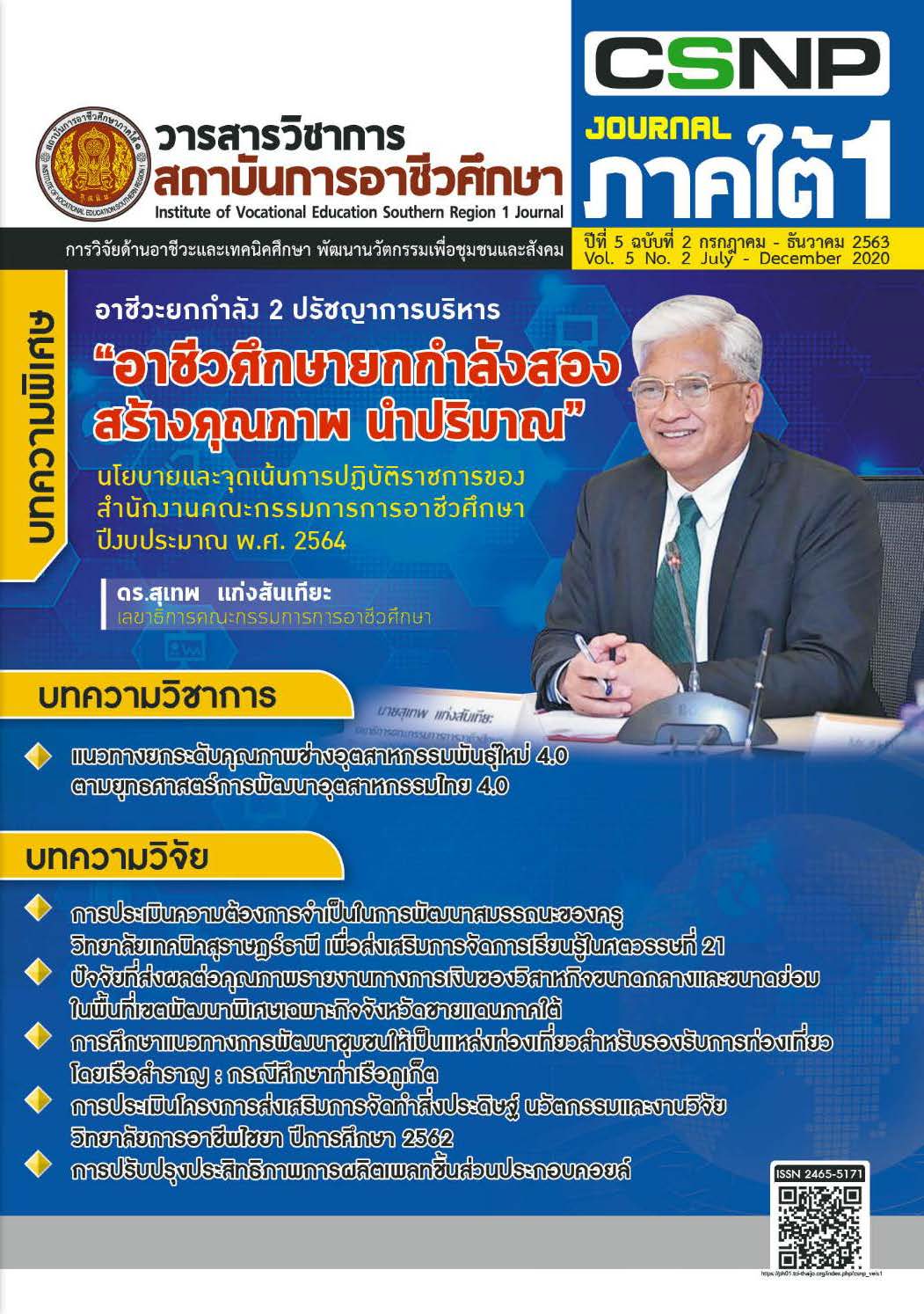การประเมินความต้องการจำเป็นในการพัฒนาสมรรถนะของครูวิทยาลัยเทคนิคสุราษฎร์ธานี เพื่อส่งเสริมการจัดการเรียนรู้ในศตวรรษที่ 21
คำสำคัญ:
ความต้องการจำเป็น, สมรรถนะครู, การจัดการเรียนรู้ในศตวรรษที่ 21บทคัดย่อ
การวิจัยในครั้งนี้มีวัตถุประสงค์เพื่อ 1) ประเมินความต้องการจำเป็นในการพัฒนาสมรรถนะของครูวิทยาลัยเทคนิคสุราษฎร์ธานีเพื่อส่งเสริมการจัดการเรียนรู้ในศตวรรษที่ 21 2) เปรียบเทียบความต้องการจำเป็นในการพัฒนาสมรรถนะของครูวิทยาลัยเทคนิคสุราษฎร์ธานีเพื่อส่งเสริมการจัดการเรียนรู้ในศตวรรษที่ 21 จำแนกตามเพศ ตำแหน่ง ระดับการศึกษา และประสบการณ์ในการทำงาน และ 3) ศึกษาแนวทางการพัฒนาสมรรถนะของครูวิทยาลัยเทคนิคสุราษฎร์ธานีเพื่อส่งเสริมการจัดการเรียนรู้ในศตวรรษที่ 21 กลุ่มตัวอย่าง ได้แก่ ครูผู้สอนวิทยาลัยเทคนิคสุราษฎร์ธานี ภาคเรียนที่ 1 ปีการศึกษา 2562 จำนวน 109 คน เครื่องมือที่ใช้ในการวิจัย ได้แก่ แบบสอบถามความต้องการจำเป็นในการพัฒนาสมรรถนะของครูวิทยาลัยเทคนิคสุราษฎร์ธานี และแบบบันทึกข้อมูลการสนทนากลุ่มสำหรับศึกษาแนวทางการพัฒนาสมรรถนะของครูวิทยาลัยเทคนิคสุราษฎร์ธานี เก็บข้อมูลโดยใช้แบบสอบถามและการสนทนากลุ่ม วิเคราะห์ข้อมูลโดยใช้ค่าความถี่ ค่าร้อยละ ค่าเฉลี่ย และส่วนเบี่ยงเบนมาตรฐาน
ผลการวิจัย พบว่า ครูวิทยาลัยเทคนิคสุราษฎร์ธานีมีสมรรถนะที่เป็นอยู่อยู่ในระดับมาก และสมรรถนะที่ควรจะเป็นอยู่ในระดับมากเช่นกัน ซึ่งเมื่อพิจารณาค่าดัชนีลำดับความสำคัญของความต้องการจำเป็น โดยภาพรวมความต้องการจำเป็นในการพัฒนาครูวิทยาลัยเทคนิคสุราษฎร์ธานีเพื่อส่งเสริมการจัดการเรียนรู้ในศตวรรษที่ 21 มีค่าเท่ากับ 0.074 และความต้องการจำเป็นในการพัฒนาตนเอง 3 ลำดับแรก ได้แก่ สมรรถนะการใช้เทคโนโลยีสารสนเทศและนวัตกรรมทางการศึกษา รองลงมาคือสมรรถนะการวิเคราะห์ สังเคราะห์และการวิจัยเพื่อพัฒนาผู้เรียน และสมรรถนะการสร้างความสัมพันธ์และความร่วมมือกับชุมชนเพื่อการจัดการเรียนรู้ สำหรับผลการเปรียบเทียบความต้องการจำเป็นในการพัฒนาสมรรถนะครูวิทยาลัยเทคนิคสุราษฎร์ธานีเพื่อส่งเสริมการจัดการเรียนรู้ในศตวรรษที่ 21 จำแนกตามเพศ ตำแหน่ง ระดับการศึกษา และประสบการณ์การทำงานงาน พบว่า ครูผู้สอนทุกกลุ่มมีความต้องการจำเป็นในการพัฒนาตนเองมากที่สุดสอดคล้องกันได้แก่สมรรถนะการใช้เทคโนโลยีสารสนเทศและนวัตกรรมทางการศึกษา สำหรับการจัดกลุ่มสนทนาเพื่อศึกษาแนวทางการพัฒนาสมรรถนะของครูวิทยาลัยเทคนิคสุราษฎร์ธานี พบว่า ควรใช้กระบวนการ PDCA โดยการจัดทำแผนงาน/โครงการที่สอดรับกับการส่งเสริมการจัดการเรียนรู้ในศตวรรษที่ 21 ของแต่ละสมรรถนะ
เอกสารอ้างอิง
[2] สำนักงานเลขาธิการสภาการศึกษา. (2559). สภาวะการศึกษาไทย ปี 2557/2558 จะปฏิรูปการศึกษาไทย ให้ทันโลกในศตวรรษที่ 21 ได้อย่างไร. กรุงเทพมหานคร : พิมพ์ดีการพิมพ์.
[3] สำนักงานคณะกรรมการการศึกษาขั้นพื้นฐาน. (2558). แนวทางการจัดทักษะการเรียนรู้ในศตวรรษที่ 21 ที่เน้นสมรรถนะสาขาวิชาชีพ. กรุงเทพมหานคร: โรงพิมพ์ชุมนุมสหกรณ์การเกษตรแห่งประเทศไทย.
[4] รสสุคนธ์ มกรมณี. (2556). [ออนไลน์]. ครู ไทยกับ ICT. [สืบค้นเมื่อวันที่ 1 ธันวาคม 2560]. จาก http://www.academia.edu/6574839/ครูไทยกับ_ICT.
[5] ถนอมพร เลาหจรัสแสง. (2559). [ออนไลน์]. 21st Century Skills for CMU Faculty Development ทักษะแห่งศตวรรษที่ 21 เพื่อการพัฒนาอาจารย์ของมหาวิทยาลัยเชียงใหม่. [สืบค้นเมื่อ 1 ธันวาคม 2560]. จาก http://www.pharmacy.cmu.ac.th.
[6] วิทยาลัยเทคนิคสุราษฎร์ธานี. (2562). ข้อมูลบุคลากร วิทยาลัยเทคนิคสุราษฎร์ธานี.สุราษฎร์ธานี: วิทยาลัยเทคนิคสุราษฎร์ธานี.
[7] บุญชม ศรีสะอาด. (2554). การวิจัยเบื้องต้น. พิมพ์ครั้งที่ 9 ฉบับปรับปรุงใหม่. กรุงเทพมหานคร : สุวีริยาสาส์น
[8] พศิน แตงจวน. (2554). รูปแบบการพัฒนาสมรรถนะบุคลากรทางการศึกษา. กรุงเทพมหานคร : ดวงกมลพับลิชชิ่ง.
[9] กิติศักดิ์ พลอยพานิชเจริญ. (2557). TQM : การบริหารเพื่อคุณภาพโดยรวม. กรุงเทพมหานคร : สมาคมส่งเสริมเทคโนโลยี (ไทย-ญี่ปุ่น).



